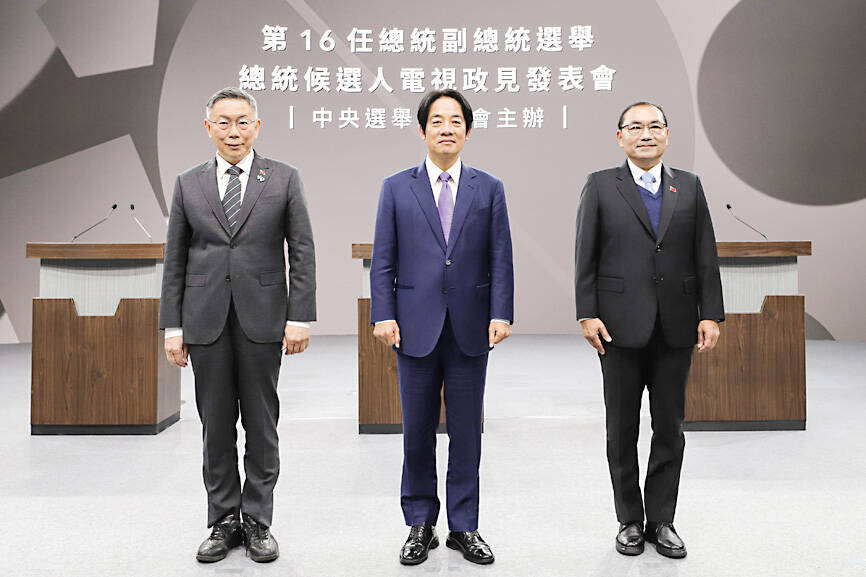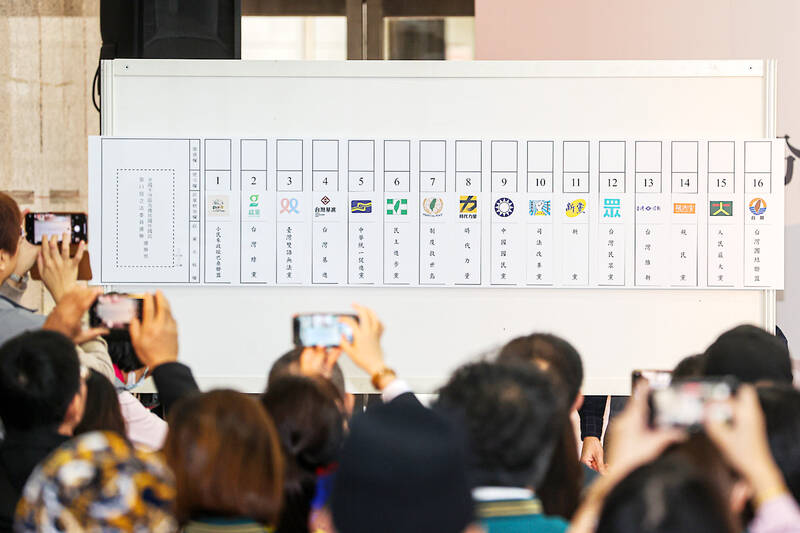The nation’s three presidential candidates yesterday clashed at the first platform presentation organized by the Central Election Commission, with each vowing to secure cross-strait peace and take better care of young people.
New Taipei City Mayor Hou You-yi (侯友宜), the Chinese Nationalist Party’s (KMT) presidential candidate, was first to speak and wasted no time in criticizing Vice President William Lai (賴清德), the Democratic Progressive Party’s (DPP) candidate.
Hou said that he would resume operations at the Special Prosecutors’ Division to investigate allegtions of corruption reported over the past seven years.

Photo: Lo Pei-de, Taipei Times
Hou vowed to uphold the Republic of China Constitution and oppose the independence of Taiwan and China’s “one country, two systems” policy.
He said that Lai has never given up being an independence activist.
He dared Lai to permanently abandon the DPP’s Taiwanese independence guidelines.

Photo: CNA
“Lai pledged to build 130,000 public housing units in eight years, but I think that check is surely going to bounce, because he built none during his two terms as Tainan mayor,” Hou said, adding that he himself had provided housing loans to young people to build families.
Lai criticized Hou and Taiwan People’s Party (TPP) Chairman and presidential candidate Ko Wen-je (柯文哲), saying that neither is fit to protect Taiwan.
“Mayor Hou, you said that you want to protect the Republic of China, but you also accept the so-called ‘1992 consensus,’ about which Chinese President Xi Jinping (習近平) has said is built on the ‘one China’ principle,” Lai said. “That would leave Taiwanese with no say over their future.”
The “1992 consensus,” a term former Mainland Affairs Council chairman Su Chi (蘇起) in 2006 admitted making up in 2000, refers to a tacit understanding between the KMT and the Chinese Communist Party that both sides of the Strait acknowledge there is “one China,” with each side having its own interpretation of what “China” means.
“Chairman Ko, you said that the KMT cannot be trusted because it would quickly lean toward China if it takes office, but the KMT said that you would move much closer to China than it would,” Lai said. “In my opinion, you two are both ‘the pot calling kettle black.’”
Apart from saying that he would spend 3 percent of GDP on national defense, Ko spent the majority of his time addressing domestic issues.
He vowed to restore fiscal responsibility by abandoning special budgets.
“The KMT says that it wants to provide housing loans to young people, while the DPP says it wants to build more public housing and give people more years to pay back loans,” he said.
“I say that the key problem is high housing prices,” Ko said, adding that he would apply his experience in pursuing residential justice as Taipei mayor if elected president.

CRITICAL MOVE: TSMC’s plan to invest another US$100 billion in US chipmaking would boost Taiwan’s competitive edge in the global market, the premier said The government would ensure that the most advanced chipmaking technology stays in Taiwan while assisting Taiwan Semiconductor Manufacturing Co (TSMC, 台積電) in investing overseas, the Presidential Office said yesterday. The statement follows a joint announcement by the world’s largest contract chipmaker and US President Donald Trump on Monday that TSMC would invest an additional US$100 billion over the next four years to expand its semiconductor manufacturing operations in the US, which would include construction of three new chip fabrication plants, two advanced packaging facilities, and a research and development center. The government knew about the deal in advance and would assist, Presidential

‘DANGEROUS GAME’: Legislative Yuan budget cuts have already become a point of discussion for Democrats and Republicans in Washington, Elbridge Colby said Taiwan’s fall to China “would be a disaster for American interests” and Taipei must raise defense spending to deter Beijing, US President Donald Trump’s pick to lead Pentagon policy, Elbridge Colby, said on Tuesday during his US Senate confirmation hearing. The nominee for US undersecretary of defense for policy told the Armed Services Committee that Washington needs to motivate Taiwan to avoid a conflict with China and that he is “profoundly disturbed” about its perceived reluctance to raise defense spending closer to 10 percent of GDP. Colby, a China hawk who also served in the Pentagon in Trump’s first team,

SEPARATE: The MAC rebutted Beijing’s claim that Taiwan is China’s province, asserting that UN Resolution 2758 neither mentions Taiwan nor grants the PRC authority over it The “status quo” of democratic Taiwan and autocratic China not belonging to each other has long been recognized by the international community, the Mainland Affairs Council (MAC) said yesterday in its rebuttal of Beijing’s claim that Taiwan can only be represented in the UN as “Taiwan, Province of China.” Chinese Minister of Foreign Affairs Wang Yi (王毅) yesterday at a news conference of the third session at the 14th National People’s Congress said that Taiwan can only be referred to as “Taiwan, Province of China” at the UN. Taiwan is an inseparable part of Chinese territory, which is not only history but

INVESTMENT WATCH: The US activity would not affect the firm’s investment in Taiwan, where 11 production lines would likely be completed this year, C.C. Wei said Investments by Taiwan Semiconductor Manufacturing Co (TSMC, 台積電) in the US should not be a cause for concern, but rather seen as the moment that the company and Taiwan stepped into the global spotlight, President William Lai (賴清德) told a news conference at the Presidential Office in Taipei yesterday alongside TSMC chairman and chief executive officer C.C. Wei (魏哲家). Wei and US President Donald Trump in Washington on Monday announced plans to invest US$100 billion in the US to build three advanced foundries, two packaging plants, and a research and development center, after Trump threatened to slap tariffs on chips made